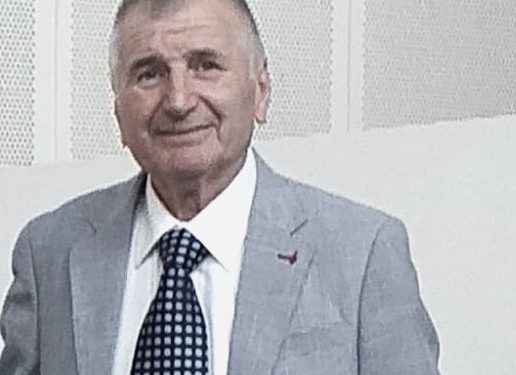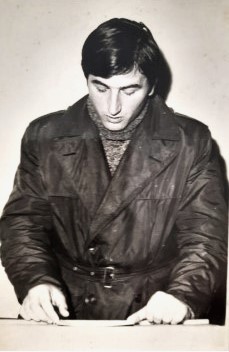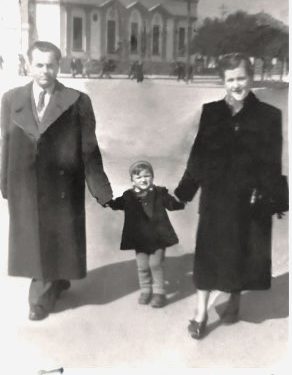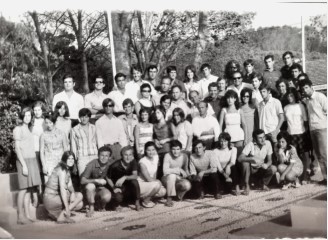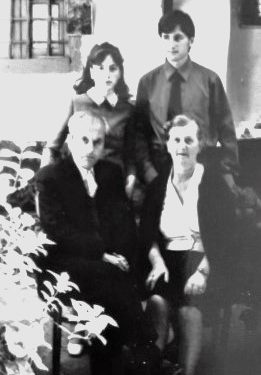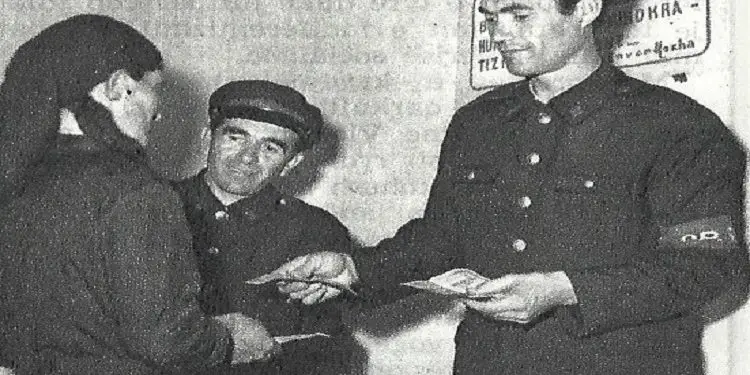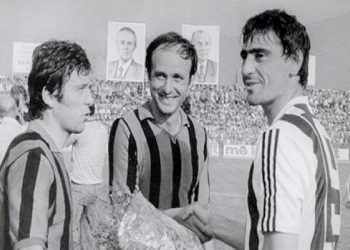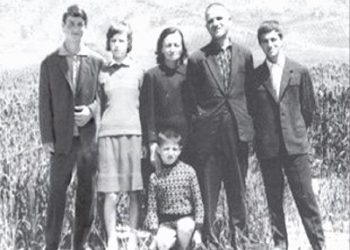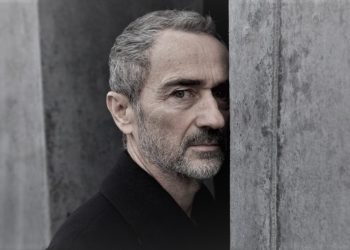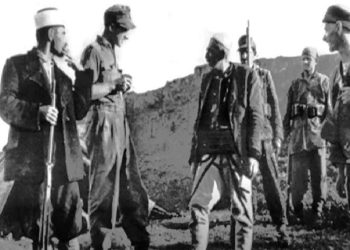By Nestor Topencharov
The third part
THE DRAMA OF LIFE
(THE STORY OF A FAMILY)
I dedicate this book to: All fellow sufferers. Their families. And in particular, to people who did not have the opportunity to tell the odyssey of life, during the communist dictatorship.
FOREWORD
Memorie.al /I was born in the city of Korça on October 22, 1953. I left Albania in October 1990, after we were given the right to repatriate to Yugoslavia (now North Macedonia) . In June 1992, I immigrated to Italy, where I still live today. Although I have been away for 32 years, I did not cut ties, as Albania was the country of my birth, where I spent 37 years, and that part of my blood is Albanian. Years later, the ties with Albania were strengthened, as I also took my wife from Durrës. We came every year on vacation, but the short time of our stay meant that many contacts were cut off. However, true friends and comrades remained forever in my heart.
In the last three years, I did not have the opportunity to visit Albania. But during 2022, I came several times. My commitment on the one hand and the coincidence on the other, made it possible for me to re-establish connections with friends and colleagues whom I had not seen for decades. Knowing my past, some of them advised me to write down what had happened in my life. At first, this idea seemed like a utopia to me, since even though I had been a good student; I had no inclination towards drafting. Then I reflected. I would just write my story, true events, where not much inspiration was needed. Perhaps a writer would know how to present these events, as a true pen artist knows. While I will write them, without many descriptions: briefly, simply, naked, as they happened.
Something else that pushed me even more to write this book was an interview on TV Klan, which I saw in October of this year, directed by the well-known journalist Blendi Fevziu. I didn’t seek revenge. But I didn’t even have justice. With the help of this book, I will make known to the Albanian public opinion, the role of the individuals who contributed to my suffering and that of my family. And today, I am putting my finger on these “beings”, not for the task they had, but for the way they performed it. I will start my writing with my grandfather, from my mother’s side, to continue with my father, where I will touch on the most important moments of their lives. This will help the reader to know my background.
Then I will also talk about myself. In this book I will also tell some events, one more dramatic than the other, that have happened to people whom I have had the honor to know. I am glad that many books have been published about the suffering and persecution of “enemies of the people” and their families in internment camps and prisons during the communist dictatorship. I was able to read some of these works. I believe that this book, in a modest way, will contribute to know even more the inhuman methods of the State Security, the way they created accusations and how they destroyed people and families to keep the people under terror.
Author
December, 2022
Continues from last issue
FIRST CHAPTER
At home we had about 8-9 silver-plated gun, from the time of Turkey, that my grandfather kept in the store window. They were in very good condition. Their iron mechanisms did not work, but they were objects of historical value. We also had many other parts of cobras, which grandfather had not managed to restore. I knew that these antique weapons also had a great monetary value. I remember that when I was in high school, a museum employee from Tirana came and offered my father 15,000 ALL for a gun. For that time this was a large amount, the quarterly salary of a worker. After talking with me, my father decided not to sell them.
Since our cellar was a good environment and without moisture, we had placed all these valuable objects, (besides the weapons there were also various objects, all made of silver), in a wooden chest. When the first inspection was done, they only glanced at the basement. At that time, the room was full of boards and pieces of old beams that had come out during construction. The father would cut these and arrange them as timber for the coming winter.
After this second visit by the Security, I thought that I would hide the coins, eggs and other silver boxes, but after many checks that were done, with a metal detector, after my arrest, they found them and took them away. No record of their seizure was made. The next day, I went back to Branch and asked Iraklius how it was possible that for some ancient weapons, my father was still being held in custody. (In the first days, word circulated in the city that the father had been arrested for carrying weapons without a permit). His answer was that: “They knew that and I would do well to return to the faculty”!
The years ’75-’76 were years of many exiles and arrests on political charges, both for individuals and for groups. One of the most common accusations was agitation-propaganda. When someone was politically punished, not only he would suffer prison, but also his family, there would be various consequences. I still didn’t know what they were accusing my father of, but nevertheless, when Irakliu suggested that I return to the faculty, I asked him if I should go to finish my studies, or to return soon. After thinking a little, he repeated that I should return to Tirana and that they knew the rest.
I didn’t have to stay in Korça anymore and the next day I returned to the faculty. I told my close friends the truth about what had happened. They stood by me, hoping that the gun issue would be cleared up. After about two weeks, the exams started and for a while I was immersed in their world. One day the sister comes. I did not expect her arrival. Mom had sent it. She was very worried, as the investigator had done another check. But this time much more detailed. They had scaled the floorboards, they had checked inside the sofas and armchairs, they had torn the mattresses, and they had behaved as if they were mad. Some had gone down to the basement, where the old boards and beams were up to the ceiling.
They had started to move them to check the environment. On one side of the basement, we had hung a lantern (type of mesh closet) where we kept the food cool, since at that time, very few families could have a refrigerator. We had several jars for pickles, we carried firewood, etc. During the inspection, the mother and Ivana were kept in the premises where the inspection was carried out and then passed to the others, which would be inspected later. In the basement, after they had removed a good part of the boards, an electric cable had come out.
They immediately alert Irakliu, who was the most important person in this control. As soon as he saw it, two Security employees were ordered to move the material carefully, because they would definitely discover something important. The work continued for several minutes, but they still had not managed to find where the cable ended. Irakli, had not taken his eyes off her the whole time. Finally, this old cable from who knows how many decades ago, ended with a small cylindrical box, older than the cable itself. It had been a part of the previous electrical line, that during the restoration of the house, the workers had thrown it into the basement, together with the boards.
After they were dusted and dusted, they finally got their disappointment. At that time I was a young man, unbeaten with life. I still didn’t know how justice worked in our country. So the next day, we went to a friend of my father’s, who lived in Tirana. At that time he was retired, but in the past, until lawyers were allowed, he had worked as one. When we told him the reason for the visit, he was very sorry, and not only for his father. His advice was that; the only place we could go was the general chief of the Investigation, in the Ministry of the Interior.
So we did. We went to the Ministry, where an employee of that office met us, since the boss was busy. He asked us, very politely, if we wanted to talk to him about the problem or come back the next day to meet the chief investigator. We agreed to talk. He was introduced to us, his name was Llambi and he was originally from a village in Korça. He was aware of our problem. We talked about everything that had happened to us.
He listened to us attentively and told us to have faith in the Party. He advised Ivana to return home immediately and I to continue the exams. We thanked him and the next day I accompanied my sister to the train. Time passed. I gave some exams. Although I was not calm about what was happening to me, I still managed to concentrate and get the highest ratings. The penultimate exam was that of raising sheep.
When I entered the exam hall, the subject professor told me that I had to report to the faculty secretariat first. I immediately understood what had happened. From the faculty’s secretariat, I was directed to that of the Institute, where I was informed of the termination of my right to study. Then, as if to justify it, I was told that the order had come from the district. And that they had nothing to do with this decision. I didn’t feel good, that they didn’t let me finish the faculty, but on the other hand, that was the least of the evils.
I was before the end of the week. Before returning to Korça, I decided to go to the Ministry on Monday. There I met Llambi again, who was not aware of the cut of the study. I noticed that his face changed and he asked me to wait a few minutes. When he returned, he told me that after returning to Korça, I should report to the head of the Investigation. I returned to the dormitory in the afternoon and started to prepare my suitcase, because the next day I would travel. I was in the room with my friends. They were upset too. We understood in silence. Maybe that was the right thing to do.
The next day, one of them accompanied me to Tirana. He was a few years older than me. When we parted, he gave me a piece of advice: “Good to everyone, and friend to no one.” I thanked my good friend and returned to Korça. When I entered the house, my mother understood and, hugging me, told me that there was no problem. We would get through this difficult situation as well. The next day, I appeared before the head of the Investigation, who, after greeting me, invited me to his office.
– “We have friends and enemies,” Reshati began the conversation. – Consequently, we do not treat their children equally. For this reason, we removed the right to study. But we can still give this right. You are a good student and you have no problem taking these exams. It is important that you tell us about the father and the others. I’m not asking you for anything right now.
Go home, reflect and come back here in a couple of days and tell us everything.” With these words, the chief closed his discussion. Not only days, but also weeks and months passed and my foot did not set foot in the boss’s office. During this time, we were tight financially. Mom had always been a homemaker. My sister was finishing high school. The only income was half of my father’s pension.
I went several times to look for work in the neighborhood, but the answer was the same: – “We don’t have any”! Mother and sister regularly went to Branch on the appointed day to bring clothes and food to father (the few that were allowed), except for one occasion, when they urgently asked for clothes. The ones they sent back were porridge. After some time, they no longer accepted him, as they told him that their father had been taken to Tirana.
June passed, July came and I was still unemployed. One day when mom and sister were going to Branch, on the sidewalk in front of Branch, they saw Lamp and approached you. Mom was seeing him for the first time, but as a person, she knew who he was. They asked him about his father. He answered that; things were not good. My mother informed me that the neighborhood did not give me work. He promised to talk to her. That evening, there was a knock on the door and the neighborhood courier brought the worksheet. Finally, I would start work, at Dvorani’s farm
This was a large fruit farm, divided into two sectors. At first I was assigned to a brigade, in the first sector. In this brigade, the main work was mainly in the vineyard, and it was harvest time. For a brigadier, I had a young daughter, whose name was Evelina. The brigade was full of young men and women. Many of them were beautiful girls, coming from the villages around the farm. No one knew the reason why I had stopped my studies.
They thought that I had missed a year of school and would work this year in production, to return to the school banks. They wanted to work in groups with me and were interested to know what I had studied. I, knowing my condition, was very reserved, but I felt good in their company. I worked for a month in this brigade. One afternoon, the bored brigadier came and informed me that the next day I had to start work in a brigade of the second sector.
Evelina had insisted to the chief of staff to keep me in her brigade, as I had left a good impression and for the reports I had created in the brigade. But the answer was clear: – “Order from above”! I thanked him and we parted as friends. Then I said goodbye to the work company. They were all sorry that we were parting and wished me well wherever I went.
The next day, the bus journey took another 10-15 minutes, but not only that. I was assigned to a brigade that had the most remote orchards in the sector. So I had to walk a lot. I was young and I didn’t mind the distance. The brigadier was an old man, a good man, and during those two months that I worked there, we had good relations. Even in this brigade, no one knew about my problem or, at least, no one gave me the impression that they knew something, or that they wanted to provoke me. I always remembered the words of my friend: “Good with everyone, friend with no one”.
The orchard covered by our brigade consisted of different kinds of cherries, ripening in parts, of many varieties of apples and plums. When I started working in this brigade, most of the cherries were picked and the main job was selling apples. In September, the mass harvesting of plums and then apples began. When we started picking apples, a part was carted in the field, while the rest was taken to the warehouses of the sector, from where it was distributed in the districts.
One day I was assigned to help a cart driver with loading and unloading, who was missing an assistant, since the transport of apples to the warehouse was done with working animals. As the chariot was overloaded and the ground was softened by the rain, the wheels dug deeper into the ground and the deserted oxen were overwhelmed. I felt sorry when the charioteer poked his butt with a stick. The stick ended with a pointed nail. Every time the oxen slowed down, the driver would poke them and they would indeed speed up, but a new trickle of blood would form in their loins.
I felt sorry for the desert animals. My family and school had educated me to treat animals with care, but I was also a sensitive person. When we got to the warehouse, I took the opportunity and pressed the nail into the wood. At least in the next load, they would have a stick without a tip on their butt.
The next period, I worked picking apples. There were jobs of different categories in the brigade. There were processes where skilled labor was required and the pay was higher. One of these was tree pruning, which began after the end of the apple picking season and continued throughout the winter. At the beginning of October, I met one of the specialists who would take me to his team. Her name was Leonidha and we worked together for a couple of weeks, picking apples.
When I moved to the second sector, I thought of doing evening school, for the profession of electrician. After I got interested, I was told that in addition to the high school document, I should also present a certificate from work, which authorized me to study for this profession. The head of the sector was called Guri. When I showed up and asked him for this certificate, he gave it to me immediately, without going into details. He was a good man. I thought of getting a profession, so that in the future, I would enter an enterprise in the city, and not remain in the fields. I enrolled, but as things turned out, I didn’t finish this school.
At the time I was working at Dvoran, the investigation continued to do other checks. Our entire community was horrified by the cars and the Security officers who were coming. The neighbors knew us for many years, as honest people and a regular family. They were surprised by the words that had spread, that we were Yugoslav agents and that during the controls; they had found our radio transmitter and the big photo of Tito.
The workers who worked in our house were also scared and perverted. The workshop hurried to finish the most important jobs and left. Some walls were not plastered and the rooms remained without doors for many years. After many checks, I told my mother not to arrange anything again, because they would come again, turn everything upside down.
In one of the controls, my mother told me, one of the Security employees, who was looking at my and my father’s suits on the clothes rack, addressed Irakli: – “Rako! Raco! Yes, these write “Made in ITALYYY”! Irakli had returned all his anger and told him to continue the inspection. There were cases when, the day after the inspection, the mother was asked to appear at the Branch, and her sister always accompanied her.
I accompanied him once. At the entrance of the Branch, we met Llambi. I noticed that when he saw me, he was concerned that I hadn’t gone to work. He advised me to immediately return to the workplace. When the mother had entered Reshat’s office, he had asked her how we knew Llambi. I never met Llambi again, but I had the impression that he did not wish me harm. Memorie.al
The next issue follows




